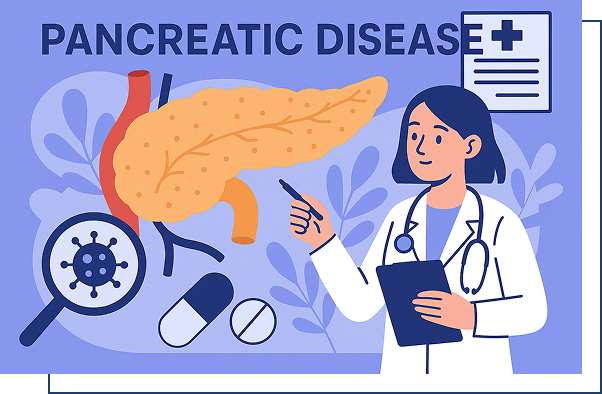Overview
The pancreas is a gland behind your stomach that plays a vital role in digestion and blood sugar control. It produces digestive enzymes that break down food into nutrients that your body can absorb and hormones like insulin, which regulate blood sugar levels. When problems arise in the pancreas, it can lead to various conditions collectively referred to as pancreatic diseases.

Types of Pancreatic Diseases
Acute Pancreatitis
A sudden inflammation of the pancreas, caused by gallstones or alcohol, which results in severe upper abdominal pain.
Chronic Pancreatitis
Long-term inflammation of the pancreas, which is often caused by heavy alcohol consumption or gallstones.
Pancreatic Fistula
An abnormal connection between the pancreas and another organ, like the skin or intestine.
Pancreatic Leak
Leakage of pancreatic fluid or enzymes from the pancreas into the abdomen due to trauma or surgery.
Pancreatic Pseudocyst
A fluid-filled collection that develops in the pancreas surrounded by scar tissue after inflammation or injury.
Book An Appointment
FAQs
Know Your Answers
Is pancreatic pain always concerning?
Pancreatic cancer is not always painful, but persistent pancreatic pain needs medical attention as it could indicate inflammation or other severe conditions.
Can pancreatitis recur?
Yes. Pancreatitis can recur, especially if triggers like alcohol or gallstones are not managed.
Can you live a normal life with pancreatic disease?
Many people with pancreatic disease can live fulfilling lives with proper management and treatment.
What should I eat to maintain a healthy pancreas?
Focus on low-fat, high-fiber foods and avoid processed sugar and alcohol.
Can diet prevent pancreatic cancer?
Maintaining a healthy diet rich in fruits, vegetables, and whole grains may reduce the risk of pancreatic cancer, but no diet guarantees prevention.


